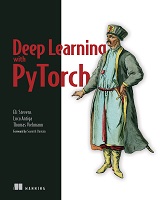
|
FreeComputerBooks.com
Links to Free Computer, Mathematics, Technical Books all over the World
|
|
- Title: Deep Learning with PyTorch
- Author(s): Eli Stevens, Luca Antiga, and Thomas Viehmann
- Publisher: Manning Publications; 1st edition (August 4, 2020)
- Permission: Free to read entire book online by the publisher (Manning), with limited time every day.
- Paperback: 520 pages
- eBook: HTML and PDF (522 pages)
- Language: English
- ISBN-10: 1617295264
- ISBN-13: 978-1617295263
- Share This:

|
Every other day we hear about new ways to put deep learning to good use: improved medical imaging, accurate credit card fraud detection, long range weather forecasting, and more.
PyTorch puts these superpowers in your hands. Instantly familiar to anyone who knows Python data tools like NumPy and Scikit-learn, PyTorch simplifies deep learning without sacrificing advanced features. It’s great for building quick models, and it scales smoothly from laptop to enterprise.
This book teaches you to create deep learning and neural network systems with PyTorch. This practical book gets you to work right away building a tumor image classifier from scratch.
After covering the basics, you'll learn best practices for the entire deep learning pipeline, tackling advanced projects as your PyTorch skills become more sophisticated. All code samples are easy to explore in downloadable Jupyter notebooks.
- Understanding deep learning data structures such as tensors and neural networks
- Best practices for the PyTorch Tensor API, loading data in Python, and visualizing results
- Implementing modules and loss functions
- Utilizing pretrained models from PyTorch Hub
- Methods for training networks with limited inputs
- Sifting through unreliable results to diagnose and fix problems in your neural network
- Improve your results with augmented data, better model architecture, and fine tuning
- Eli Stevens has worked at startups in Silicon Valley, with roles ranging from software engineer to CTO.
- Luca Antiga worked as a researcher (biomedical engineering), a cofounder and CTO of an AI company.
- Thomas Viehmann is a machine learning and PyTorch trainer, consultant, and a PyTorch core developer.
- Deep Learning and Neural Networks
- Python Programming
- Machine Learning
- Artificial Intelligence
- Data Science
 Similar Books:
Similar Books:
-
 Deep Learning for Coders with Fastai and PyTorch
Deep Learning for Coders with Fastai and PyTorch
This book show you how to train a model on a wide range of tasks using fastai and PyTorch. You'll also dive progressively further into deep learning theory to gain a complete understanding of the algorithms behind the scenes.
-
 Dive into Deep Learning (Aston Zhang, et al.)
Dive into Deep Learning (Aston Zhang, et al.)
This is an open source, interactive book provided in a unique form factor that integrates text, mathematics and code, now supports the TensorFlow, PyTorch, and Apache MXNet programming frameworks, drafted entirely through Jupyter notebooks.
-
 Deep Learning with Python, 2nd Edition (Francois Chollet)
Deep Learning with Python, 2nd Edition (Francois Chollet)
This book introduces the field of deep learning using Python and the powerful Keras library. It offers insights for both novice and experienced machine learning practitioners, and builds your understanding through intuitive explanations and practical examples.
-
 Deep Learning with JavaScript: Neural Networks in TensorFlow.js
Deep Learning with JavaScript: Neural Networks in TensorFlow.js
This book shows developers how they can bring Deep Learning technology to the web. Written by the main authors of the TensorFlow library, it provides fascinating use cases and in-depth instruction for deep learning apps in JavaScript in your browser or on Node.
-
 Deep Learning (Ian Goodfellow, et al)
Deep Learning (Ian Goodfellow, et al)
Written by three experts, this is the only comprehensive book on the subject. It offers mathematical and conceptual background, covering relevant concepts in linear algebra, probability theory and information theory, numerical computation, and machine learning.
-
 Learning Deep Architectures for AI (Yoshua Bengio)
Learning Deep Architectures for AI (Yoshua Bengio)
This book discusses the motivations for and principles of learning algorithms for deep architectures. By analyzing and comparing recent results with different learning algorithms for deep architectures, explanations for their success are proposed.
-
 Probabilistic Machine Learning: An Introduction (Kevin Murphy)
Probabilistic Machine Learning: An Introduction (Kevin Murphy)
This book is a comprehensive introduction to machine learning that uses probabilistic models and inference as a unifying approach. It is written in an informal, accessible style, complete with pseudo-code for the most important algorithms.





